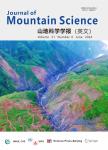Human impact gradients via anthropogenic pollen indicators:insights gleaned from a case study in the Rif Mountains(Northern Morocco)
作者机构:BiologyEcologyand Health LaboratoryDepartment of BiologyFaculty of Sciences of TetouanAbdelmalek Essaâdi UniversityTetouan 93002Morocco Department of BotanyFaculty of PharmacyUniversity of GranadaGranada 18071Spain Andalusian Institute for Earth System Research(IISTA-CEAMA)University of GranadaGranada 18100Spain BiologyEnvironmentand Sustainable Development LaboratoryENSAbdelmalek Essaadi UniversityTetouan 93000Morocco CANN-MED&BALDIYA CROPS SARLTangier 90010Morocco
出 版 物:《Journal of Mountain Science》 (山地科学学报(英文))
年 卷 期:2024年第21卷第12期
页 面:4223-4235页
核心收录:
学科分类:0710[理学-生物学] 071001[理学-植物学] 07[理学]
主 题:Modern Pollen analysis Rif mountains Pollen indicators Human impact Northern Morocco Anthropogenic index score
摘 要:Understanding the relationship between modern pollen and vegetation is crucial for interpreting fossil pollen records and assessing human impact on the environment,both of which are essential for effective environmental management *** numerous studies on fossil pollen records in the Rif landscape,research specifically focusing on modern pollen and its implications for understanding human impact on the natural landscape is notably *** paper presents novel anthropogenic pollen indicators for the Rif Mountains and seeks to evaluate the gradients of human impact on the southern Mediterranean *** employed a combination of modern pollen analysis,vegetation survey,and ordination techniques,incorporating various environmental and land-use *** correspondence analysis(CCA)allowed us to evaluate the relationships between pollen types and environmental variables,helping us identify key anthropogenic pollen indicators associated with land use and human activities:Poaceae,Cannabist,Olea-t,and Asteraceae for cultivation;Brassicaceae,Genista-t,Poaceae,Asteraceae and Plantago-t,for grazing;Apiaceae,Urtica-t and Genista-t for slashing and ***,an anthropogenic index score(AIS)was calculated for each sampled *** analysis(CA)was then used to correlate each specific pollen type with levels of human impact as follows(a)low(e.g.,Cedrus atlantica-t,Quercus canariensis-t),(b)moderate(e.g.,Erica-t,Arbutus unedo-t,Eucalyptus-t),and(c)high(e.g.,Cannabis-t,Brassicaceae,Olea-t,Nicotiana-t).This paper enhances our comprehension of land-use dynamics and impact levels,providing essential insights for evaluating anthropogenic impact trends and human-induced changes in the Rif Mountains landscape.



